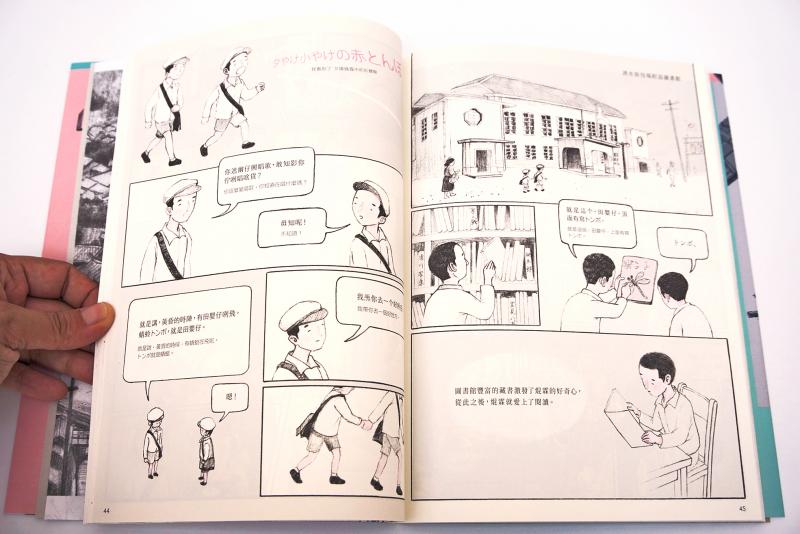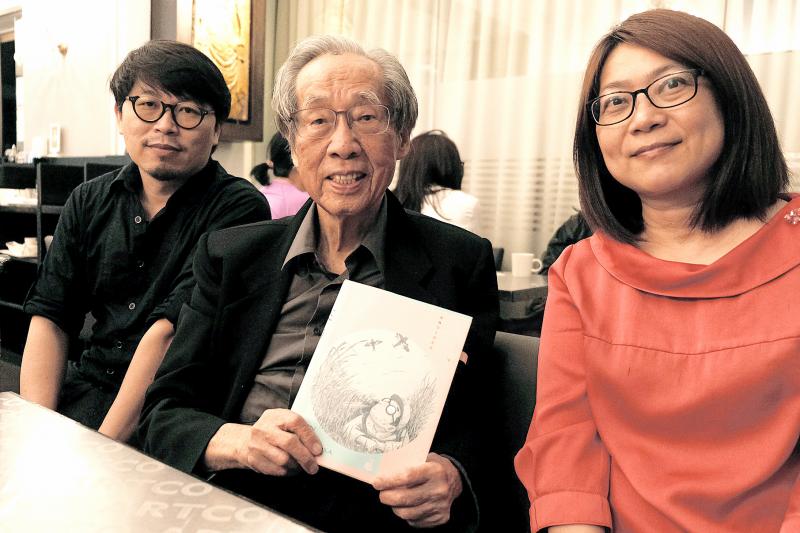The first book of a biographical comic series titled Son of Formosa (來自清水的孩子) on Tsai Kun-lin (蔡焜霖), a political prisoner during the White Terror era, hit the shelves on Tuesday.
Tsai, 90, was imprisoned on Green Island from 1950 to 1960, following a crackdown on members of the Taipei Workers Committee, a group of Chinese Communist Party sympathizers planted within various government agencies.
The four-book series raised NT$1 million (US$33,389) through crowdfunding, and was a collaboration between Slowork Publishing, National Taitung University professor Yu Pei-yun (游珮芸) and illustrator Chou Chien-hsin (周見信).

Photo: Cheng Ming-hsiang, Taipei Times
Yu and Chou spent nearly four years collecting background information, interviewing Tsai and poring through history books to get the buildings, background and clothing of the era right.
In 1966, Tsai began publishing a children’s magazine titled Prince (王子雜誌), which contained popular comics, for which the Ministry of Culture honored him with a Special Contributions award at the 2018 Golden Comic Awards.
Slowork Publisher president Huang Pei-shan (黃珮珊) said the company plans to release the second book next month, and complete the whole set by next year.

Photo: Cheng Ming-hsiang, Taipei Times
Because of social-distancing measures due to the COVID-19 pandemic, the company was not able to hold a book launch, Huang said, adding that he hoped to reach out to people over the Internet and persuade them to support original products that tell a tale about Taiwan.
Huang said the series has piqued the interest of overseas publishers, especially in the European region, because of its content and portrayal, with some referring to it as the Taiwanese version of Persepolis, a French comic series by Marjane Satrapi that depicts her childhood to early adult years in Iran during and after the Islamic Revolution.
It is highly possible that the series could become popular internationally, Huang said.
Political dissidents and communist sympathizers were suppressed during During the The White Terror refers to the suppression of political dissidents and communist sympathizers, as well as public discussion of the 228 Incident, when Taiwan was under martial law from May 19, 1949, to July 15, 1987.

The Grand Hotel Taipei on Saturday confirmed that its information system had been illegally accessed and expressed its deepest apologies for the concern it has caused its customers, adding that the issue is being investigated by the Ministry of Justice Investigation Bureau. The hotel said that on Tuesday last week, it had discovered an external illegal intrusion into its information system. An initial digital forensic investigation confirmed that parts of the system had been accessed, it said, adding that the possibility that some customer data were stolen and leaked could not be ruled out. The actual scope and content of the affected data

‘LIKE-MINDED PARTNER’: Tako van Popta said it would be inappropriate to delay signing the deal with Taiwan because of China, adding he would promote the issue Canadian senators have stressed Taiwan’s importance for international trade and expressed enthusiasm for ensuring the Taiwan-Canada trade cooperation framework agreement is implemented this year. Representative to Canada Harry Tseng (曾厚仁) in an interview with the Central News Agency (CNA) said he was increasingly uneasy about Ottawa’s delays in signing the agreement, especially as Ottawa has warmed toward Beijing. There are “no negotiations left. Not only [is it] initialed, we have three versions of the text ready: English, French and Mandarin,” Tseng said. “That tells you how close we are to the final signature.” Tseng said that he hoped Canadian Prime Minister Mark Carney

POSITIVE DEVELOPMENT: Japan and the US are expected to hold in-depth discussions on Taiwan-related issues during the meeting next month, Japanese sources said The holding of a Japan-US leaders’ meeting ahead of US President Donald Trump’s visit to China is positive news for Taiwan, former Japan-Taiwan Exchange Association representative Hiroyasu Izumi said yesterday. After the Liberal Democratic Party’s landslide victory in Japan’s House of Representatives election, Japanese Prime Minister Sanae Takaichi is scheduled to visit the US next month, where she is to meet with Trump ahead of the US president’s planned visit to China from March 31 to April 2 for a meeting with Chinese President Xi Jinping (習近平). Japan and the US are expected to hold in-depth discussions on Taiwan-related issues during the

President William Lai (賴清德) yesterday bestowed one of Taiwan’s highest honors on Saint Vincent and the Grenadines (SVG) Ambassador Andrea Clare Bowman in recognition of her contributions to bilateral ties. “By conferring the Order of Brilliant Star with Grand Cordon on Ambassador Bowman today, I want to sincerely thank her, on behalf of the Taiwanese people, for her outstanding contribution to deepening diplomatic ties between Taiwan and SVG,” Lai said at a ceremony held at the Presidential Office in Taipei. He noted that Bowman became SVG’s first ambassador to Taiwan in 2019 and